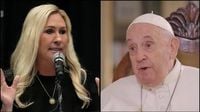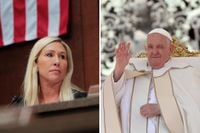Pope Francis, the beloved leader of the Roman Catholic Church, passed away on April 21, 2025, at the age of 88. His death, attributed to a stroke followed by heart failure, was confirmed by the Vatican press office. The pontiff had been facing serious health challenges since early 2025, including a severe respiratory infection that required hospitalization and progressed to pneumonia in both lungs.
Just hours after the news broke, Republican Representative Marjorie Taylor Greene of Georgia stirred controversy with a post on X (formerly Twitter). She wrote, "Today there were major shifts in global leaderships. Evil is being defeated by the hand of God." This statement was met with immediate backlash, with many interpreting it as a celebration of the Pope's death.
Critics quickly took to social media to express their outrage. One user remarked, "Marjorie Taylor Greene seemingly celebrating the death of Pope Francis is a new low even for her. This woman is vile." Another added, "He fought against poverty, for immigration reform and climate change. So he must be super evil because he thought poor people deserved a fair shake." A third commenter called her post "unbelievably disrespectful," emphasizing that compassion should be the priority in such moments of mourning.
However, some of Greene's supporters suggested that her post was not aimed at Pope Francis but rather at Klaus Schwab, the founder of the World Economic Forum (WEF), who also announced his resignation on the same day after 50 years at the helm. Greene has long been a vocal critic of Schwab and the WEF, accusing them of promoting globalist policies.
Greene’s history with the Catholic Church is fraught with controversy. In a 2022 interview, she labeled the Church as being "run by Satan," particularly criticizing its charitable efforts to aid undocumented immigrants. "The Church’s support for undocumented immigrants is Satan controlling the Church," she stated at the time, which led to significant backlash from Catholic leaders and organizations.
The Catholic League condemned Greene’s remarks as anti-Catholic and inflammatory, calling them "beyond the pale." Despite the criticism, Greene stood firm, asserting that her statements were a defense of Christian values against what she perceives as the Church's political activism. "Nothing could be further from the truth," she insisted in response to the backlash.
As Pope Francis's death reverberated around the world, many public figures expressed their condolences. The White House issued a statement mourning his passing, which included images of the Pope's meetings with President Donald Trump and Vice President JD Vance, who had met with him just a day before his death. Trump paid tribute on his social media platform, Truth Social, stating, "Rest in Peace Pope Francis! May God Bless him and all who loved him!" Following the announcement of the Pope's death, Trump ordered that U.S. flags be flown at half-staff in his memory.
Pope Francis had been a prominent figure in advocating for social justice issues. He was known for his progressive stances on various topics, including immigration reform and climate change. Just hours before his death, he made a surprise appearance during his traditional Easter blessing in St. Peter's Square, where he greeted thousands of pilgrims and tourists.
In recent years, Greene has become a polarizing figure in American politics, often drawing sharp criticism for her remarks on various issues, including her views on the Catholic Church and its leadership. Her comments regarding Pope Francis and the Church have positioned her as a staunch defender of Evangelical Protestant values, particularly in her criticisms of perceived liberalism within religious institutions.
In light of Pope Francis's significant contributions to global discussions on moral leadership and social issues, many are reflecting on his legacy and the impact of his work. His passing marks a pivotal moment in the Catholic Church, raising questions about the future direction of the Church and its leadership.
As the world mourns the loss of Pope Francis, the reactions from political figures like Greene highlight the ongoing cultural and ideological battles that characterize contemporary discourse. Greene's comments, whether interpreted as a critique of the Pope or a broader commentary on global leadership, underscore the contentious nature of political dialogue in the United States today.
Whether one agrees or disagrees with Greene's views, the juxtaposition of her post against the backdrop of Pope Francis's death reveals a deeper divide in how religious and moral leadership is perceived and discussed in the public sphere. As the Catholic Church prepares for the transition in leadership, many will undoubtedly be watching closely to see how these dynamics evolve in the coming days.






